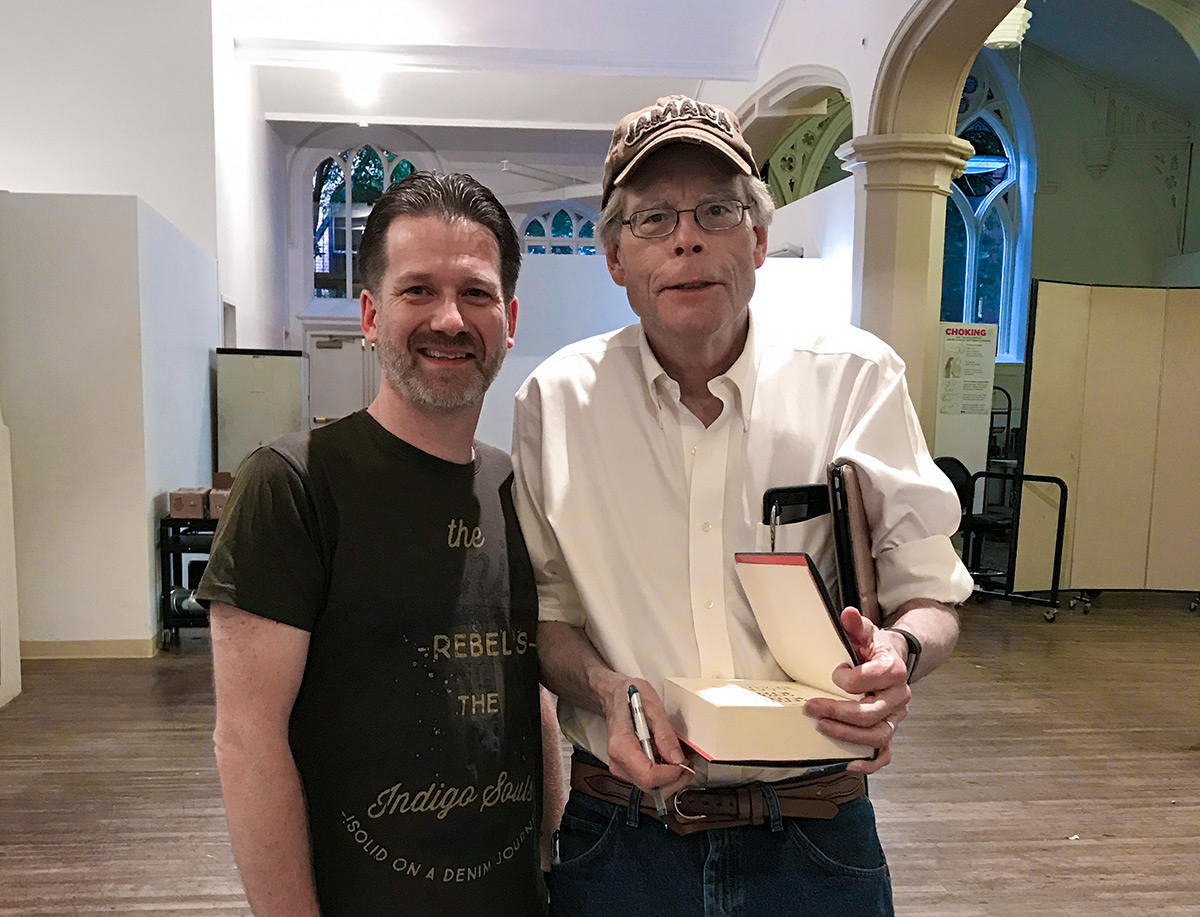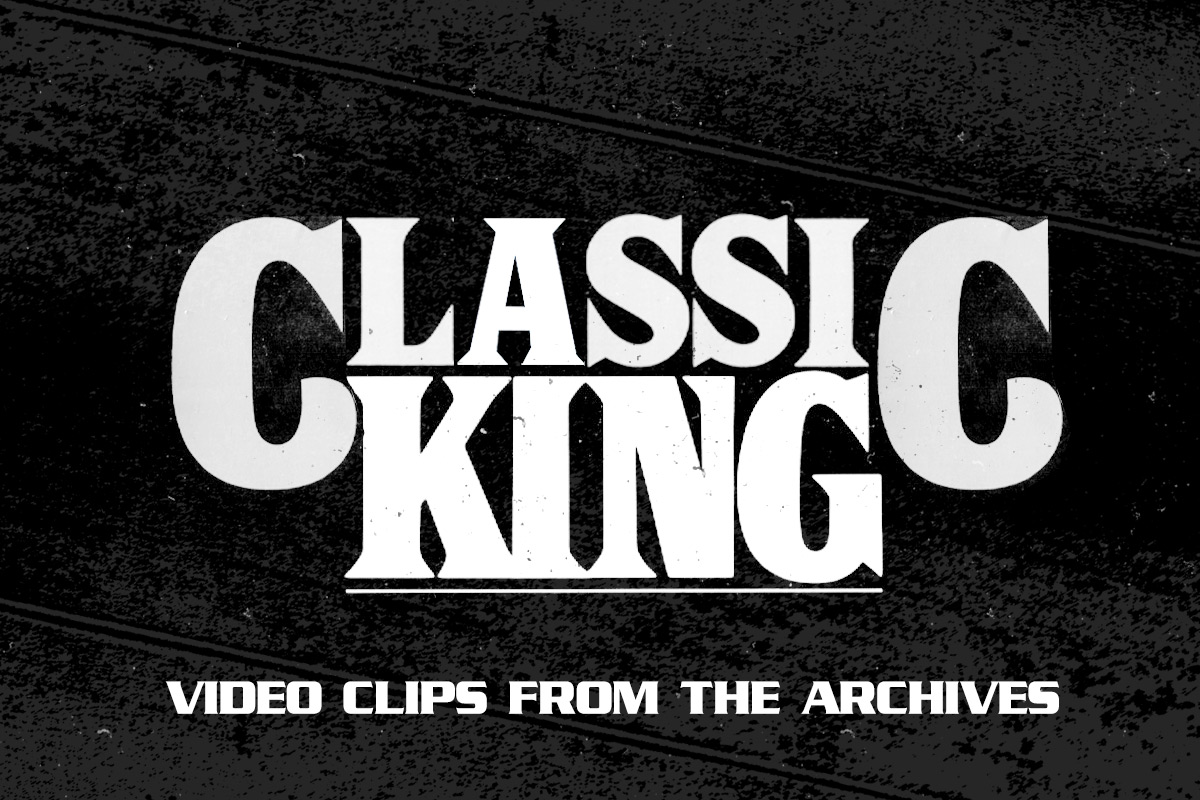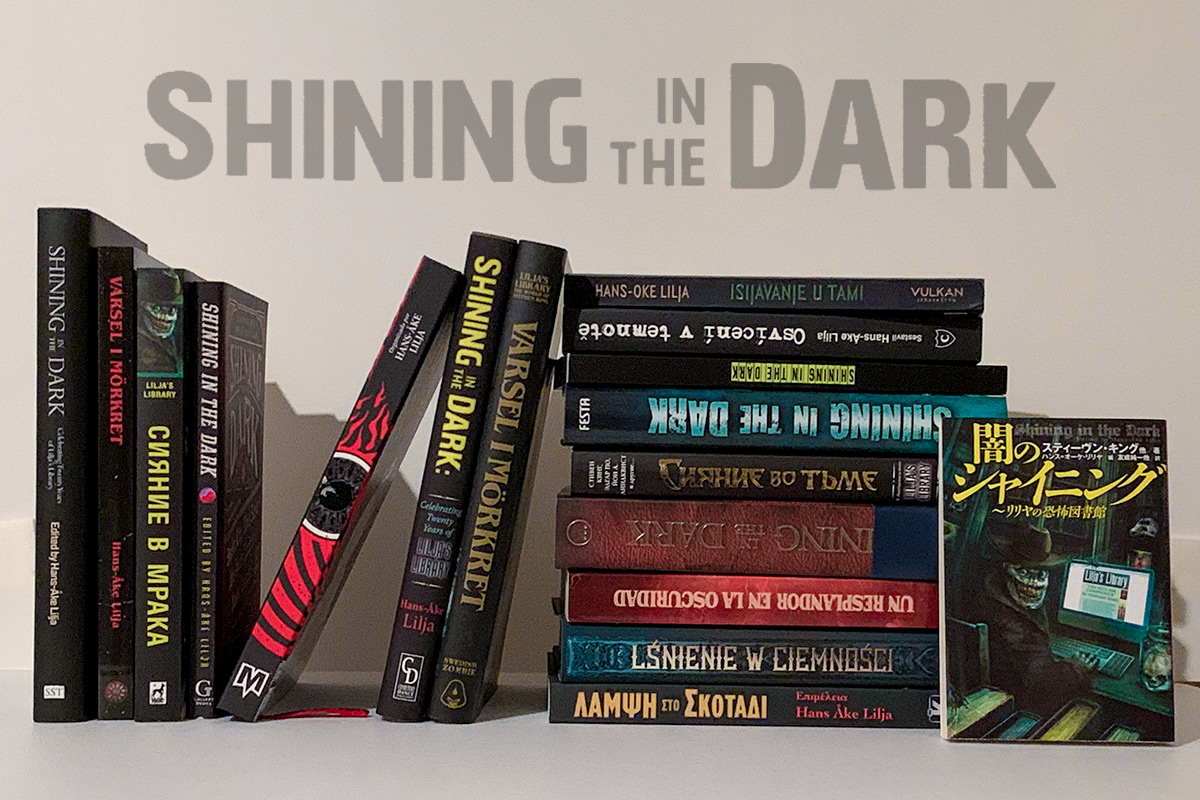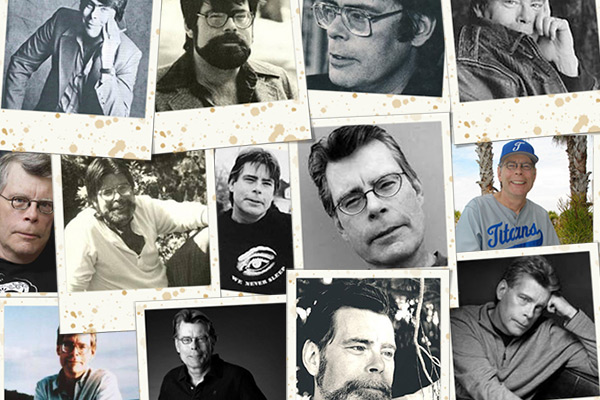George Guidall
Posted: November 24, 2003
_
 Hi George, thanks for doing this interview.
Hi George, thanks for doing this interview.Lilja: When I read the introduction of you that I got from Simon & Schuster Audio I got to wonder if you ever get any time off. It seems you would have to work all the time to manage to do all those things. How do you find the time?
George Guidall: Time off? When you love doing something as much as I love narrating the written word, "time off" is practically a deprivation. After 800 or so unabridged narrations, translating the written art form into the spoken art form becomes a way of life. I record from 9 AM to 4 PM four days a week. That means I'm preparing a book while I'm recording one that I've already read. It's a rhythm I've developed over the years so it's not really as demanding as it may sound. I do always have a book with me, though. If I find myself somewhere with time on my hands and I'm "bookless," I go into a form of withdrawal and read whatever is near. Billboards, discarded newspapers, bumper stickers, even the fine print on credit cards can suffice in an emergency.
Lilja: Off all the things you do, what do you prefer doing? Reading or acting and why?
George Guidall: I must tell you: After 40 years in the theatre, no activity has as much significance to me or is as satisfying and rewarding as recording a wonderfully written novel. I tour the country with a library presentation entitled AN EVENING WITH GEORGE GUIDALL; THE ART AND ARTIFICE OF AUDIOBOOK NARRATION. With every performance I am constantly amazed at the dedication and commitment that audiobook listeners have demonstrated. After a stage performance, people have waited to compliment me and express their appreciation of my work as an actor. These are moments in time, though, and gradually fade in the minds of the audience. Audiobook listeners, however, spend hours of prime time, not only listening, but forming a relationship with the reader on a very primal level. People have always needed to be told stories. They've looked to the story teller for comfort, for escape, for vicarious adventure, and for examples of human potential and achievement that might enrich their lives. Through the grace and talent of some authors I can manage to add to their work a level of emotional immediacy to the reader which makes the book(s) all the more enjoyable. Not better, mind you. Different. Reading Proust is an awesome experience for anyone. Listening to it can bring out emotional shades not otherwise appreciated. I've just completed recording Edith Grossman's new translation of Don Quixote. What a marvelous journey! Listening to it will make it all the more accessible for people (over 40 hours of ear time!) and add colors that (I hope!) will contribute to the overall appreciation of this wonderful work. And the same with Steven King's Dark Tower series! From The Gunslinger to the end of Roland's saga, I hope those who read with their ears get as much enjoyment out of the work as I will have done on completing the last book. Performing the work has opened it up for me, allowed me to highlight relationships, accentuate and perhaps even create moods and take full advantage of Steven King's imagination. What a pleasure!
Lilja: I couldn't imagine narrating an audio book myself. I wouldn't be able to keep focused for so long. Even though I assume you don't read the whole book in one sitting. I feel it would be hard to keep my voice and the tone of it right which it needs to be to keep the reader interested? Do you have any secret tricks?
George Guidall: Secrets? I'm an actor. I've been trained to use MY imagination to bring life to the written word. In the recording studio it's the mind and the voice at work. Too much body work hits the microphone and I have to start over. Don't laugh. It's happened. Sawing the air too much, I've been known to punch the mike and nearly burst an engineer's eardrum. No carbonated beverages. No gas-producing lunches. Dairy is a mucous producer, nuts get in your teeth, coffee dries the mouth, bread is a stomach silencer. But, let's not get too personal. The tricks are vocal. The work is through the mind and heart.
Lilja: How hard is it to get in character when you read a book and more interesting, how hard is it to switch between many different characters? My experience is that the ability of the reader to do this can be the difference between success and failure.
George Guidall: Usually, there are about two or three major characters in any novel. Maybe four. The rest are peripheral, important, but not the ones we focus on constantly. There can't be too much vocal play with the main characters. It would draw too much attention away from the flow of the book. One doesn't want the listener to think about the narrator's "wonderful" vocal flexing. There's more room to add color to the other characters, though. One has to have enough differentiation so the listener doesn't spend time trying to figure out who's doing the talking. There are some sadistic authors who have, say, presidential cabinet meetings, or huge family reunions, and when that happens I tend to go slightly psychotic and engineers come into the booth with restraining gear and high-pressure hoses.
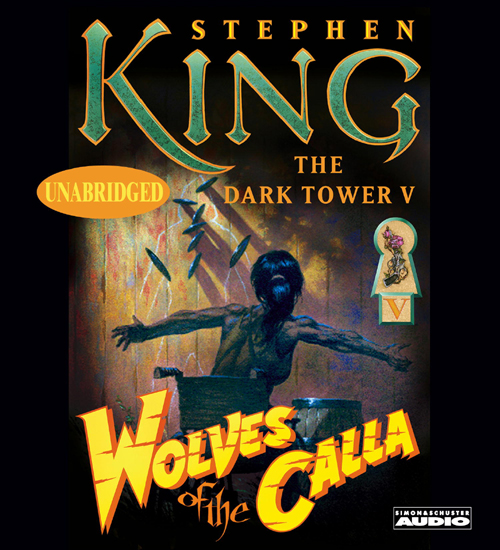 Lilja: How do you prepare for recording a book like Wolves of the Calla? Do you read the book before you go into the studio?
Lilja: How do you prepare for recording a book like Wolves of the Calla? Do you read the book before you go into the studio?George Guidall: The most important part of preparation for me is discovering the author's emotional point of view in writing the story. For me, it's not simply a question of conveying information from the page to the ear. One can listen to news broadcasts and get that. There has to be an emotional point of departure at the very outset with which to engage the listener. This is key for me. I imagine myself as the original story teller and search for an appropriate mood which enables me to tell the story. It's a narrative concept which acts as a frame for the experience. I read every book before we start the recording. It would be unfair to do less. Arrogant, really. The author has spent considerable time creating his piece. I need to do him justice. Would an actor start rehearsals of a play without reading it first? Steven King says find the truth within the lie. You don't find the emotional truth or any other kind by winging it.
Lilja: How long does it take to record a book the size of Wolves of the Calla?
George Guidall: The usual ratio is 2:1. One hour of recording for every 2 hours spent doing it. That's an average. Some books are easier. Some more difficult. Wolves of the Calla runs approximately 26 hours. That means about 40-50 hours of studio time. Probably less, because I found it engrossing and the prose didn't present any major obstacles. King's writing is honest, with it's own natural flow. As a literary surfer, I simply rode the wave home. It was great fun.
Lilja: You are picking up after Frank Muller who read The Dark Tower books before you. First by reading the revised and expanded edition of The Gunslinger and the three last books. How did this happen and do you feel Muller's shadow hanging over you? Many fans thought he was "the" King reader.
George Guidall: Frank Muller and I have been friends since before I began audiobook narration. We shared the stage in a production of a Faydeau farce, entitled Flea in Her Ear back in the '70s. It's a strange feeling recording "his' material. He IS "the" King reader, as you say, and it is not my intention to minimize that fact. Actually, recording this material brings me closer to him in a way. I think of him constantly while I do it. It's unavoidable. His tragic accident has deprived many people of extraordinary listening pleasures. Anyone wishing to contribute to his long and arduous recovery can contact the Wavedancer Foundation for information. The funds would be greatly appreciated.
 Lilja: It says in your bio that you have recorded over 800 unabridged novels. That is probably more books that I will ever read in my lifetime. Do you have a favorite?
Lilja: It says in your bio that you have recorded over 800 unabridged novels. That is probably more books that I will ever read in my lifetime. Do you have a favorite?George Guidall: Favorites? There are a few. King's work, of course. Proust's In Swann's Way, Lamb's I Know This Much is True, Frankenstein, Thomas H. Cook's mysteries, Crime and Punishment - oh, there are so many. Why don't I just include a list and you can disperse it like milkweed to the wind. [The list can be found last; Lilja's comment.]
Lilja: After reading so many novels by other authors, have you ever thought about writing a novel yourself?
George Guidall: You've probably hit on the reason I love doing this. I'm most likely a frustrated writer. Which is why this interview is so long-winded.
Lilja: I understand that you also read The Bookman's Promise by Cliff Janeway, which will be released in March 2004 and will be reading The Dark Tower VI (August 2004) and The Dark Tower VII (November 2004). Anything else new on the way?
George Guidall: Bookman's Promise is written by John Dunning. Cliff Janeway is his major character. Dunning is another of my favorites. Great stories. Crime in the wonderful world of antique book dealers. Janeway is a retired cop and owns a bookstore. Just completed the second of a series of elegantly written WWII novels of people's struggles to stem the Nazi tide in Europe as the war progressed. Espionage and love and betrayal and marvelously drawn pictures of Europe in the early forties. Allen Furst's novels are Kingdom of Shadows and Blood of Victory. They are top notch.
Lilja: Again, thanks for doing this interview. Are there any last thoughts you want to chare with the visitors of Lilja's Library?
George Guidall: Let us all congratulate Steven King on his life-time achievement award at the National Book Awards on November 19th. If anyone deserves it, he certainly does, Not only for his tremendous output, but for his journey to the top as well as his ever-present generosity to fellow writers and, yes, even to audiobook narrators.
A Suggested List for Audiobook Listeners
- The Devil's Advocate by Morris West
- Nautical Charts
- Shadow Song by Terry Kaye
- The Ghostwriter by Roth
- Patrimony by Roth
- Frankenstein
- Corrections by Franzen
- Crime and Punishment
- Rise to Rebellion by J. Shaara
- Snow Falling on Cedars
- The Good Earth
- In The Deep Mid-Winter by Clarke
- Cheaper by the Dozen
- I Know This Much is True, by Wally Lamb
- Thomas H Cook: Any one of his books (The latest: The Interrogation)
- Hunchback of N.D.
- Gates of the Alamo
- Tides of War... by Pressman
- Gates of Fire... by Pressman
- 2nd Glance by Picoult
- Any of Max Byrd's Bios by Grant, Jackson, Jefferson
- Remembrance of Things Past; In Swann's Way by Marcel Proust
- The Cat Who...series by Lillian Jackson Braun
- Tony Hillerman Navaho Mysteries
- The Killer Angels by Michael Shaara
George Guidall has recorded over 800 unabridged novels, bringing a consistent artistry to his readings and delighting listeners for over 20 years. His narrations of everything from classics like Crime and Punishment and The Iliad to best sellers like Snow Falling on Cedars and Lillian Jackson Braun's Cat Who... series have set a standard for excellence recognized throughout the audiobook industry. Acclaimed as one of the original "Golden Voices" in Audiofile magazine, he holds the record for the most "Earphone" awards (32) given by the magazine to any narrator for excellence in narration. In addition to his award-winning work as an audiobook narrator, Guidall has also enjoyed a forty-year career in the theatre, including starring roles on Broadway in such plays as Chapter Two, Cafe Crown, Alone Together, and Cold Storage. He has received an Obie award for best performance Off-Broadway, and has shared the stage at the New York Shakespeare Festival with Kevin Kline, Morgan Freeman, Meryl Streep, and Tracy Ullman.

